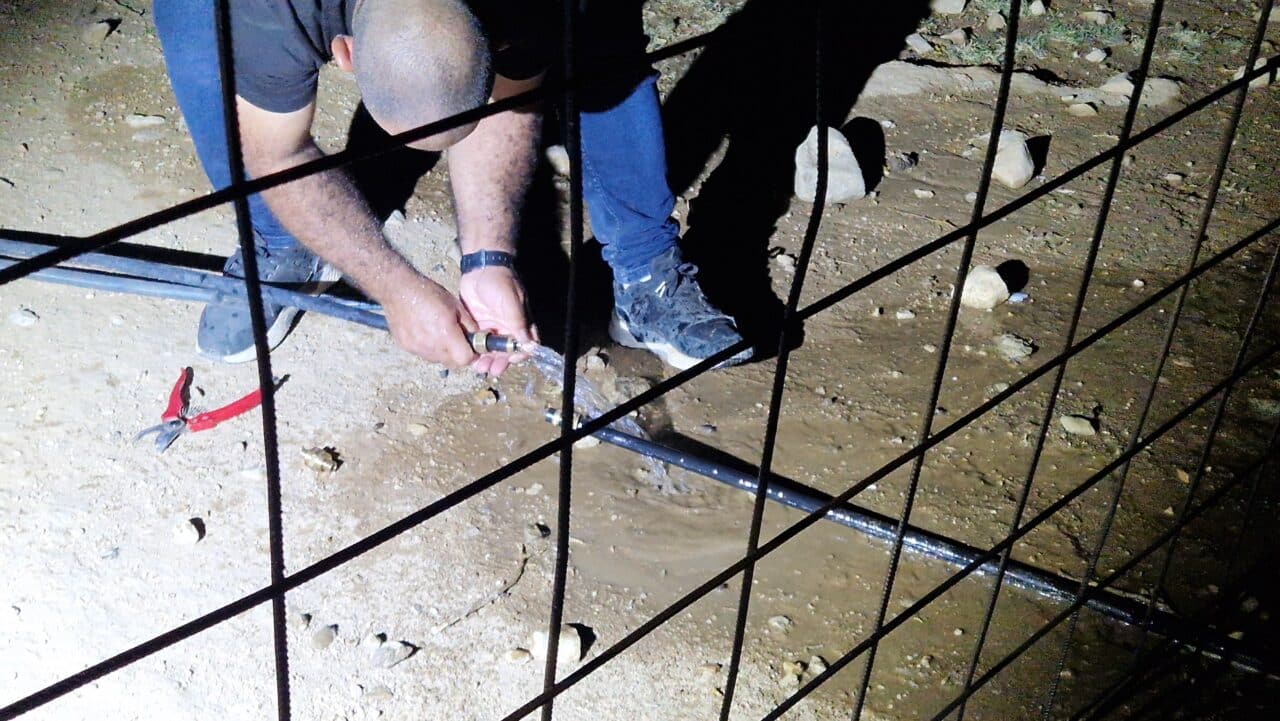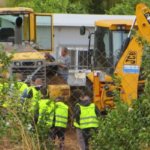West Bank: enduring the restrictions in the Jordan Valley
26-01-2011 Photo gallery
http://www.icrc.org/eng/resources/documents/photo-gallery/israel-occupied-territories-photos-2011-01-25.htm
Since it occupied the valley in 1967, Israel has put in place a range of measures, including stringent restrictions on construction and movement. The measures hamper development, adversely affect livelihoods and generally make life very difficult for Palestinians living close to the 30 Israeli settlements in the valley.
-

Palestinian children at school in Al-Fasayil Foqa village, Jordan Valley. For lack of land, Palestinian village authorities built this school in an Israeli-controlled area. The school is now earmarked for demolition by the Israeli authorities.
© ICRC / A. Romenzi / il-e-02302
-

Al-Fasayil Foqa village, Jordan Valley Unable to get building permission, this Palestinian woman and her family of 12 live in cramped conditions in a two-room house in an area controlled by the Israeli administration.
© ICRC / A. Romenzi / il-e-02303
-

A Bedouin community in the upper Fasayil village, Jordan Valley. The majority of rural communities in the Jordan Valley are farmers or semi-nomadic Bedouins who traditionally graze their livestock across the desert valley in search of water and fresh feed. The Bedouin are increasingly restricted in their movement.
© ICRC / A. Romenzi / il-e-02304
-

A dry agricultural pool in Al-Jiftlik village, Jordan Valley. Access to water sources, for domestic and agricultural use, is increasingly limited for the population of the Jordan Valley. Shallow wells traditionally used by rural Palestinian communities dried up after being connected to water systems serving Israeli settlements.
© ICRC / A. Romenzi / il-e-02305
-

A derelict house in Al Jiftlik village, Jordan Valley. Home to some 3,700 people, the village barely has land for construction and no sewage treatment facility.
© ICRC / A. Romenzi / il-e-02306
-

A Palestinian mother brings her new-born baby to a Palestine Red Crescent medical clinic in Al-Jiftlik, Jordan Valley. Restrictions on the construction and development of public infrastructure force thousands of residents in Al Jiftlik to rely on this small health clinic.
© ICRC / il-e-02307
-

Abedelhadim Abedelnazik Masaeid (39), a Palestinian farmer works on his tiny piece of land in Al-Jiftlik, Jordan Valley, where he grows onions. Palestinians here suffer from lack of access to water due to restrictions and inequitable use of the commodity by Israeli agricultural settlements.
© ICRC / A. Romenzi / il-e-02309
-

This was once Abedelhadim Abedelnazik Masaeid’s house in Al-Jiftlik. The Israeli army demolished it in 2007because he had built it without an official permit, which is virtually impossible to obtain in this area under Israeli control.
© ICRC / A. Romenzi / il-e-02310
-

Abedelhadim Abedelnazik Masaeid’s children in their one-room house in Al-Jiftlik. Residents of Al-Jiftlik are reluctant to enlarge their homes or build new houses only to have them demolished.
© ICRC / A. Romenzi / il-e-02308
-

A Palestinian herder from Al Mu’ arajat area in the Jordan Valley. The Bedouin face increasing difficulties, including repeated demolitions of their tents and animal sheds. The herders find less and less land where they are permitted to dwell and graze their flocks.
© ICRC / A. Romenzi / il-e-02311
-

A Palestinian school in Furush Beit Dajan. Owing to restrictions on construction, a classroom in this school also serves as a health clinic, to the detriment of the school. The clinic works on Saturdays.
© ICRC / A. Romenzi / il-e-02312
-

Rafie Mofadi Abu Jish (38) in the converted bus, in Furush Beit Dajan, where he lives with his wife and four children “The living conditions are horrible”, he says.
© ICRC / A. Romenzi / il-e-02313
-

A Bedouin girl in the north of the Jordan Valley. Palestinian Bedouins have inhabited the Jordan Valley in large numbers for the past century. A traditional agricultural community that relies mainly on stockbreeding and seasonal farming, they face movement and building restrictions, as well as severe restrictions on their use of water.
© ICRC / A. Romenzi / il-e-02314
-

A Bedouin shepherd with his flock in Samara community, Jordan Valley. For centuries, Bedouin herders have grazed their sheep on their lands. While stock-breeding is the Bedouins’ main source of livelihood, the valley’s grazing lands that they need are in areas closed off for Israeli military use.
© ICRC / A. Romenzi / il-e-02316
















